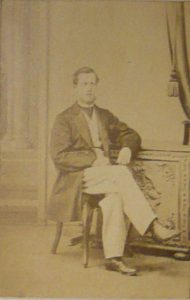In January I did a talk as part of the Thursday lunchtime recital room series. It was entitled ‘Memories from the Archives’ and I talked about a number of memories from Old Scholars. I’ll share the photographs and text from the talk in several parts on the blog. Read Part 1 here.

Photograph from 1866 John Ford Memorial
George Scarr Watson wrote some reminiscences for the Sheffield branch of the Old Scholars Association, which were then reprinted in Bootham magazine in 1908, fifty years after he left school.
In the article he remembers music (or lack of it), sleep, and columns.
“The bare rooms of my day, cold, and destitute of sinful ornament, knew only the voice and the restrictions of the plain Friend. No music soothed our savage breasts save the siren strains of the Jews’ harp, and that was only tolerated for its Biblical associations. Now, I am told, string bands call up the ghosts of protesting broad brims and coal-scuttle bonnets, or would do if the sacrificial fire of a few years ago had not exorcised them and initiated a new era. Laughter and shouts are perennial, and we could do as well as our successors; we could sing too, in a way, but surreptitiously. Our choral song at 10pm one night was loud and without the refinement of a trained chorus, but the teacher who heard us need not have said he thought at first it was a party of drunken revellers returning home from their carouse.” It wasn’t until 1882 that the Committee gave the Headmaster permission to hire a piano, to be used only for practice during leisure time.
He goes on to outline his day, starting with the “wakening sound of the horrid startling bell – they always, as the little boy said, send you to bed when you are not sleepy, and make you get up when you are.” Staying in bed too late earned you columns. He says “Ten minutes’ work at twelve words per minute equals one hundred and twenty words: three syllable words extracted from Butter’s spelling book, beginning with ‘ abrogate, absolute, adamant, admiral, affable, aggravate’ (I know them still), and written on a slate.” Apparently one of the other boys at school at the time got into trouble so many times that he became very proficient, so was given a section of Virgil to be learnt instead.
Often those writing about their education expressed views about how good (or not) their style of education was, and what they thought a good education should look like. These are George’s suggested seven principles of education (his alternative to the seven arts and sciences of grammar, rhetoric, logic, arithmetic, geometry, astronomy and music).

